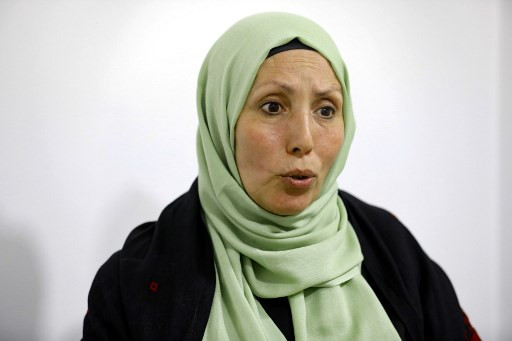Popular Reads
Top Results
Can't find what you're looking for?
View all search resultsPopular Reads
Top Results
Can't find what you're looking for?
View all search resultsFour women at forefront of Israel's Arab political surge
All major parties in the Jewish state are led by men, with women making up only 25 percent of lawmakers in the Knesset, or parliament.
Change text size
Gift Premium Articles
to Anyone
 Iman al-Khatib, an Arab Israeli newly elected to Israel's parliament, speaks to AFP in the northern Israeli town of Kafr Kanna on March 4, 2020. Al-Khatib is about to become Israel's first hijab-wearing MP and is part of a group of Arab women poised to expand their voice in Israel's male-dominated politics.
(AFP/Ahmad Gharabli)
Iman al-Khatib, an Arab Israeli newly elected to Israel's parliament, speaks to AFP in the northern Israeli town of Kafr Kanna on March 4, 2020. Al-Khatib is about to become Israel's first hijab-wearing MP and is part of a group of Arab women poised to expand their voice in Israel's male-dominated politics.
(AFP/Ahmad Gharabli)
N
ewly elected Israeli MP Iman al-Khatib, greeting supporters in Nazareth, shook hands with women but tapped her heart with her right hand for men.
The gestures signaled the Muslim identity of the woman who is about to become Israel's first hijab-wearing MP and part of a group of Arab women poised to expand their voice in Israel's male-dominated politics.
All major parties in the Jewish state are led by men, with women making up only 25 percent of lawmakers in the Knesset, or parliament.
But in March 2 elections, one party managed to double its female representation, albeit from a low base.
The predominantly Arab Joint List won 15 of the Knesset's 120-seats, the alliance's best-ever performance and up from 13 during stalemate election last September.
The List also counts four women among its incoming MPs, up from two in September.
Khatib will be part of the Knesset's largest ever contingent of Arab women, including three Joint List colleagues and a Druze woman from the centrist Blue and White party.
The List draws most of its support from Israel's roughly 20-percent Arab minority -- who have Israeli citizenship but are Palestinian by heritage.
Israel's Arab minority complain of discrimination and accuse Prime Minister Benjamin Netanyahu of treating them as second-class citizens.
Netanyahu counters that his government has invested more in Arab neighborhoods than any in the history of the Jewish state.
The List's elected women told AFP that while they will focus on their constituent's concerns, they also care about wider issues in Israeli society.
"Do not make the veil a barrier. Look at the capabilities of the veil's wearer -- their ethics, work, skills and attitudes," said Khatib, a 54-year-old mother of four.
There are "religious Jewish women in the Knesset", she added. "We didn't hear any comment about them."
"We must deal with people first as human beings."
'Lack of options'
Like other Arab-Israeli MPs, Khatib speaks fluent Hebrew.
She studied social services at Tel Aviv University, specializing in women's support. In parliament, she wants to tackle issues ranging from violence in Arab neighborhoods to poverty and housing.
"Sixty-four percent of women are excluded from work, not because they don't want to work but due to conditions and lack of travel options," she said, referring to the Arab population.
Inflexible hours mean Arab women often need to leave for work before their children go to school, she said.
"These issues must be put on the table at the Knesset."
The new parliament will be sworn in next week but some fear it will last only a few months.
No bloc has a 61-seat majority, a repeat of inconclusive polls in April and September 2019.
Netanyahu's right-wing Likud won 36 seats and controls a total of 58, counting its allies.
Netanyahu's main rival Benny Gantz, who heads Blue and White, needs the Joint List's support to even consider forming a government.
The List's head Ayman Odeh has indicated he could back Gantz under certain conditions.
Israel's youngest lawmaker
Aida Touma, a Christian Arab-Israeli re-elected on March 2, is on the List's four-person team negotiating with Gantz.
A women's activist before entering parliament in 2015, Touma stressed that the List's incoming female MPs "are from all walks of life and are capable and serious representatives of the whole of society".
The Joint List is an alliance of parties representing both Muslim and Christian Arab Israelis, as well as some Jewish leftists.
Its members range from Islamists to communists.
One member, Sundus Salih, is at 34 about to become Israel's youngest lawmaker.
The mother of three is from Al-Mashhad town near Nazareth and has a masters in science and technology.
"There are differences between the [List's] parties... but we four women unite and agree on most things," Salih told AFP.
"As a mother and a teacher I am worried by the proliferation of violence and guns."
The fourth member of the quartet almost didn't make it on the ballot.
Hiba Yazbek, also from Nazareth, was blocked as a candidate by the Central Elections Committee over Facebook posts allegedly supporting terrorism.
She denied the charges and won an appeal. Now she is determined to use her Knesset seat to fight for Arab rights.
"We intend to translate our great electoral strength into political positions that reinforce our position as Arabs in this country and confront the right wing and its agendas," she told AFP.









